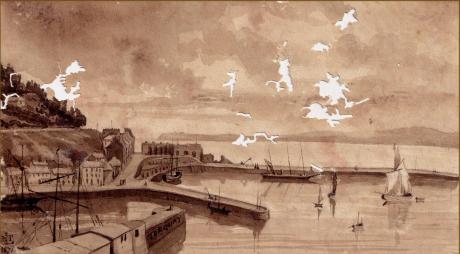inscribed on the mount "Torquay"
There was little development until the early 19th century, when Lawrence Palk, 2nd Baronet built a new harbour here. ... Later in the century, Torquay became a favoured resort for the upper classes. In 1870, Lawrence Palk, 1st Baron Haldon built another new harbour for the town which made it popular with yacht sailors.
The History of Torquay, a town in Torbay, on the south coast of the county of Devon, England, starts some 450,000 years ago with early human artefacts found in Kents Cavern. There is little evidence of any permanent occupation at Torquay until the eleventh century records in the Domesday Book, though it is known that visits were made by Roman soldiers and there was a small Saxon settlement called 'Torre'. In 1196 Torre Abbey was founded here, which by the time of its dissolution in 1539, had become the richest Premonstratensian Monastery in England. The buildings were bought by Sir George Cary in 1662. The Cary family and the Briwere family between them owned much of the land now occupied by Torquay. By the 19th century, most of the land was owned by three families: the Carys, the Palks, and the Mallocks.
There was little development until the early 19th century, when Lawrence Palk, 2nd Baronet built a new harbour here. Much of the later building in the town was done by his solicitor, William Kitson, who was put in charge of the Palk estates in 1833. At this time the town started to attract visitors in ill health as a winter resort because of its fresh air and mild climate. Its population grew by over ten times in the first 50 years of the century. Later in the century, Torquay became a favoured resort for the upper classes. In 1870, Lawrence Palk, 1st Baron Haldon built another new harbour for the town which made it popular with yacht sailors. It was also extensively used for importing coal and wool from Australia.
During the First World War a number of hospitals and convalescent homes were set up in the town. Between the wars, a major advertising campaign by the Great Western Railway ensured that Torquay became a major holiday resort. In World War II, the town, with its preponderance of hotels, provided extensive training facilities for the RAF. From 1944, many American troops were also stationed here. The town was bombed several times.
In 1948 Torquay hosted the watersports events of the Olympic Games. In 1950 the European Broadcasting Union was formed here. More recently the town has become popular with foreign language students, and since the expansion of the EU in 2004, many Polish and Czech workers have settled here.


